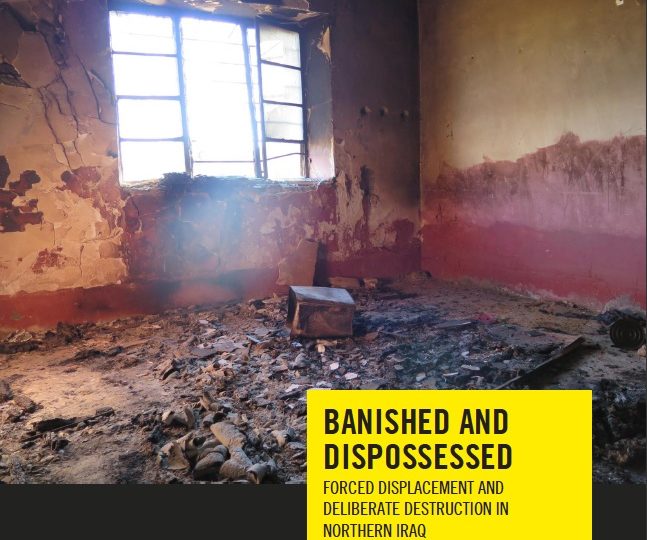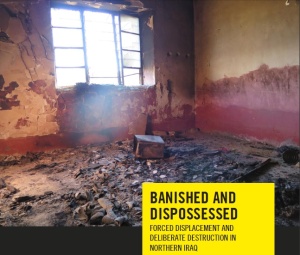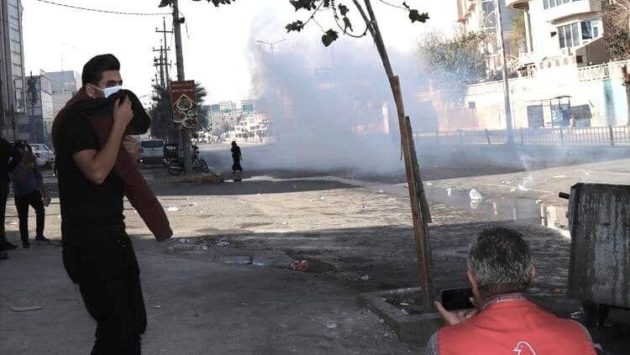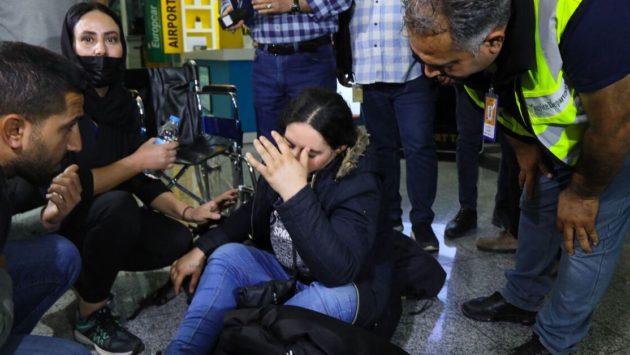AI Report on Northern Iraq: Banished and Dispossessed
A report by Amnesty International, Jan 20, 2016.
Peshmerga forces of the Kurdistan Regional Government (KRG) and Kurdish militias in northern Iraq have bulldozed, blown up and burned down thousands of homes in Arab villages. Though KRG officials have tended to justify the displacement of Arab communities on grounds of security, it appears to be used to punish them for their perceived sympathies with so-called Islamic State (IS), and to consolidate territorial gains and establish control over “disputed areas” of the country, which the KRG authorities have long claimed should be part of the semi-autonomous Kurdistan Region of Iraq (KRI).
Between October 2014 and November 2015 Amnesty International visited 13 villages and towns which were recaptured by Peshmerga forces between August 2014 and March 2015 and from which Arab residents remain banned – the towns of Jalawla, Zummar and Makhmur and the villages of Jiri, Sibaya, Umm Khabari, Khazuka, al-Sayir, Barzanke (north-west), Maktab Khaled, (centre), Bahiza, Jumeili, and Tabaj Hamid (north-east) – and reviewed Satellite images for eight of these 10 villages and two others, Nahrawan (centre) and Tubaykh (north-east), and interviewed displaced residents from these and 15 other villages in surrounding areas. However, increasing restrictions on access to these areas have been imposed by the Kurdish authorities in recent months, after reports by media and human rights organizations exposing forcible displacement and destruction of property.
Amnesty International has extensively documented war crimes, crimes against humanity and other gross abuses committed by IS fighters and other parties in Iraq.
The organization is aware that a large number of Iraqis displaced by the conflict in Iraq, from all ethnic and religious communities, including many Arabs, have sought refuge in areas controlled by the KRG, and that the KRG authorities have been faced with significant humanitarian and security challenges as a result. However, the cases of forced displacement of residents and unlawful destruction of civilian homes and property highlighted in this report are not isolated incidents. Rather, they are examples of a wider pattern across the disputed areas of northern Iraq, where parties which had long vied for exclusive control of these areas are now intent on consolidating territorial gains they have made as a result of battlefield successes against IS. Further, these abuses appear to have at times been committed in retaliation for residents’ family or community ties or perceived support for members of IS or other armed groups who perpetrated widespread atrocities against civilians and Peshmerga forces in the areas.
Such practices are in violation of international law regulating the conduct of the parties to a non-international armed conflict, which prohibits the displacement of civilians and the destruction or seizure of property not required by imperative military necessity. Suspicions or vague allegations that a certain population group or community may support or cooperate with the enemy does not constitute imperative military necessity and cannot justify measures which amount to collective punishment. Amnesty International considers that such cases of forced displacement and unlawful destruction of civilian property should be investigated as war crimes.
Amnesty International calls on the KRG to put an end to the unlawful destruction of homes and property, allow those forcibly displaced to return to their homes, provide reparation to victims of such violations, and take steps to ensure those responsible for the abuses are held accountable. The KRG should establish a transparent process to inform residents displaced from areas under effective KRG control of the access and damage status of their villages, and of the procedures and required criteria for residents to be allowed to return to their homes and villages.
Amnesty International also urges all states providing military and other assistance to the KRG -including members US-led coalition fighting IS such as the UK and Germany, and others providing training and capacity building- to take concrete and measurable steps to ensure that any assistance they provide does not contribute to the commission of violations of international humanitarian law such as forced displacement and unlawful destruction, and to publicly condemn such violations.
Download the full report: https://www.amnesty.org/download/Documents/MDE1432292016ENGLISH.PDF




